The New York subway fills with street vendors: The only ‘job’ where they can bring their children
A new survey reveals that access to childcare is one of the biggest obstacles to employment faced by migrant parents. Eight out of 10 have turned to street vending because they have no one to take care of their kids


Valeria is half hidden behind a column at the Broadway Junction subway station in Brooklyn, New York. While preparing a serving of pineapple with lemon juice and chili powder in a plastic cup, the street vendor of Ecuadorian origin says that she has been selling fruit at different stops on the city’s subway for eight months. She knows well that what she does is illegal — she has received five fines, $100 each, and ended up in jail on one occasion — but she takes the risk every day because it is the only way she has found to earn any money since she arrived in the city after leaving from her native country. “I am here out of necessity, because I have a family behind to support. My fingers are full of blisters from cutting and preparing the fruit and walking with everything from side to side, but this sacrifice is for my children,” the 28-year-old Ecuadorian whispers amid the roar of the passing trains.

The children she is talking about are the two kids who are still in Ecuador and her baby, who was born in New York a year ago when she arrived in the city with her husband. Although she does not have her baby with her this Tuesday at the end of June, Valeria — who asked that her real name not be used for fear of being detained or even deported — says she often has had to carry the child on her back while working because she has had no one to take care of him. Like her, of the more than 200,000 migrants who arrived in New York in the last two years, many have resorted to street selling of fruits and sweets in subway stations and public parks. They do this because it is the only job where they can take their children along with them, since they have nowhere or no one to leave them with.

In fact, eight out of 10 migrant sellers say that if it weren’t for the fact that they didn’t have anyone to take care of their children, they would look for other job options. That’s according to a survey published last week by Algún Día, an initiative founded last January to evaluate and address the needs of this community of sellers. Between March and May, Algún Día volunteers, mostly social workers, surveyed 75 migrant vendors with children across New York City and found that access to childcare was one of the biggest obstacles to employment faced by migrant parents.
That is why these families end up selling fruits and sweets in public spaces. From early in the morning until the afternoon rush hour, it is common to see migrant women with their children moving from station to station, pushing carts and refrigerators in which they store strawberries, grapes, watermelon and other fresh fruits, as they search for the platform that is the busiest but also the least monitored by the authorities. Children, from babies to teenagers, stay close to their mothers. Some help sell items too. Although male vendors are sometimes seen, they are mostly young women. In fact, 34% of the people surveyed by Algún Día were women under 25 years of age and 75%, like Valeria, were from Ecuador.
These vendors do not have a support network they can rely on to care for their children, as they left many of their relatives in their home countries and know few people in the city. Furthermore, these families live in places where they cannot leave their children alone. According to the survey, 31% of the respondents reside in one of the more than 200 migrant shelters set up by the city, where they are not allowed to leave their children unsupervised. And another 32% share an apartment or room, often with people they do not know and do not trust to take care of their children.
Aid not reaching those who need it most

While most vendors need help caring for their children during work hours, very few know that the city offers resources to do so. In fact, 100% of the people surveyed by Algún Día were unaware that there is local and federal aid for undocumented migrants and asylum seekers who cannot cover the cost of child care programs, an expense that in New York specifically amounts to $20,000 a year on average. This is because the vast majority — 93% — of sellers have not received help from any organization or government agency. “Vendors remain almost entirely unconnected to the resources and supports that exist in NYC. They have not received assistance with basic needs like health insurance or school enrollment for their children,” the organization states in its report.
In other words, it’s not that there is no aid, it’s that it isn’t reaching those who need it most, explains Tiffany Hervas, one of the founders of Algún Día. “Many are unaware of the resources available to them” because government agencies have not done enough to get the information to them, adds the Ecuadorian-born social worker. “They think that disseminating information is just handing out pamphlets and that’s it, but it requires much more effort.”
For her, what’s important is to first share information and then make sure people understand the materials they have received. “Many of these people don’t understand the language, they don’t have a phone, they don’t have email, they don’t have internet access to consult the resources. All of these barriers are part of the reason this community has fallen through the cracks.”

The main option available to these vendors with children is a program called Promise NYC, under which the city pays childcare costs for hundreds of low-income undocumented families. Launched in January 2023, this initiative currently helps 683 children. It is a lifeline for families who — because of their immigration status — cannot access other federally funded childcare, explains Liza Schwartzwald, director of Economic Justice and Family Empowerment at the New York Immigration Coalition (NYIC), which funds the Algún Día project. “It’s a phenomenal program. We criticize a lot of things the city does or doesn’t do, but Promise NYC is probably the best example I have of something the city has really done well,” Schwartzwald says.
But the program was at risk of disappearing. New York Mayor Eric Adams, a Democrat, did not include funding for Promise NYC in his budget proposal for the next fiscal year, which begins Monday, July 1. However, pro-immigrant organizations such as NYIC and the New York City Council pressured the Adams administration to renew the program and expand its funding from $16 million to $25 million. Promise NYC started with a budget of $10 million, which later rose to $16 million. But, according to Schwartzwald, $25 million is needed to expand the program and help the thousands of migrant families who continue to arrive in the city.
In the end, Adams agreed to both requests and Promise NYC will have a budget of $25 million for the coming year. “Promise NYC is the only program in the city that is fully accessible to these families, but it does not have enough places,” says Schwartzwald. Until now, the program was intended to help about 600 children at a time, when more than 70% of the 200,000 migrants who have arrived in New York since 2022 are families with children, according to city figures. The funding expansion was necessary “to meet the needs we have right now,” Schwartzwald adds.
Hostility, fines and fear
In addition to the difficulties in finding childcare, the vendors surveyed by Algún Día identified another problem they face in their daily lives: the police presence in subway stations. Specifically, 60% fear being fined by the police, as has happened to Valeria five times. “Sometimes there are good cops, other times there are bad cops. You always have to be aware. Just seeing them makes me panic,” she admits, clearly on alert. Her gaze darts from side to side, scanning the subway platform up and down to make sure there are no police officers nearby. “If they see us, they take everything from us, throw it in the trash, and give us a ticket. They have given me five fines, and they are $100, in other words, what I earn in a day goes to a single ticket,” she says.

For one of those fines, she ended up going to prison for 24 hours. “They locked me in at 7 p.m. and I came out the other day at the same time. I was in a cell with other women, it was very traumatizing. I only thought about my baby, he was with his dad, but I didn’t know what was going to happen to me. If they were going to deport me or what, I was very worried,” she remembers. She says that she had to appear in court, but that the judge did not want to hear the case: “He told me ‘I don’t want to know anything, this is not a crime.’ He didn’t ask any questions and asked that the case be dismissed. I left that court and hugged my husband and my baby, crying a lot. Since then, I have been very careful with the police, I try to flee if I see them. I’m learning the shifts of when the good police officers work and when the bad ones work, and that’s how I adapt.”
According to Algún Día, vendors also face hostility from New Yorkers themselves. The organization found that 64% have felt unsafe while working and that many have “been harassed by teenagers and homeless individuals” and “have experienced or witnessed traumatic experiences.” “There are people who criticize us, they insult us for being immigrants and for doing something illegal,” says Valeria. “But we have no choice but to continue doing it.”
As she speaks, an older man approaches her and hands him several bills that are folded and difficult to distinguish. Judging by the colors of each bill, it must be at least $25. Valeria takes the money and, since she doesn’t speak English, points to the fruit in front of her, as if asking: what can I serve you? The man, who clearly does not speak Spanish, smiles at her, shakes his head to indicate that he does not want anything and says goodbye. “There are also very good people,” says Valeria, her eyes full of tears.
Sign up for our weekly newsletter to get more English-language news coverage from EL PAÍS USA Edition
Tu suscripción se está usando en otro dispositivo
¿Quieres añadir otro usuario a tu suscripción?
Si continúas leyendo en este dispositivo, no se podrá leer en el otro.
FlechaTu suscripción se está usando en otro dispositivo y solo puedes acceder a EL PAÍS desde un dispositivo a la vez.
Si quieres compartir tu cuenta, cambia tu suscripción a la modalidad Premium, así podrás añadir otro usuario. Cada uno accederá con su propia cuenta de email, lo que os permitirá personalizar vuestra experiencia en EL PAÍS.
¿Tienes una suscripción de empresa? Accede aquí para contratar más cuentas.
En el caso de no saber quién está usando tu cuenta, te recomendamos cambiar tu contraseña aquí.
Si decides continuar compartiendo tu cuenta, este mensaje se mostrará en tu dispositivo y en el de la otra persona que está usando tu cuenta de forma indefinida, afectando a tu experiencia de lectura. Puedes consultar aquí los términos y condiciones de la suscripción digital.








































